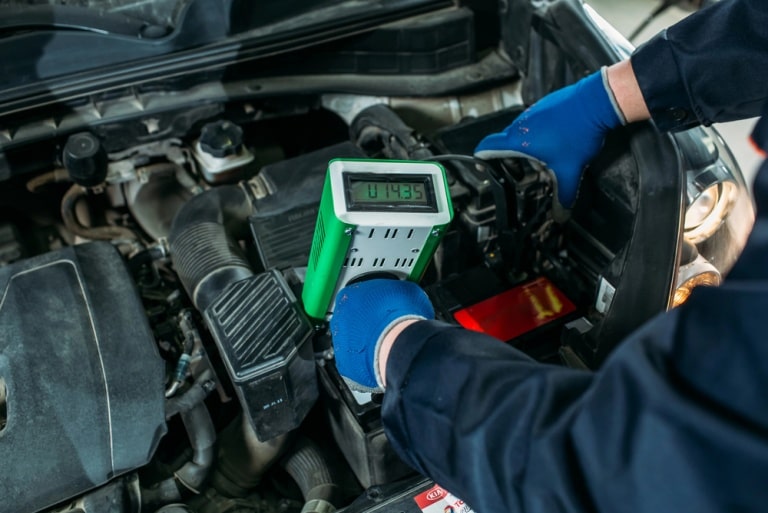How Long Does a Car Battery Last? Tips for Maximizing Battery Life

Your car battery is one of the most essential parts of the vehicle and the beating heart of its electrical system.
That’s why you always need to ensure that it remains in the best condition for functionality and performance, which is why many car owners may wonder, “How long should a car battery last?”
In this article, I’ll walk you through a brief guide with everything you need to know to answer the question. Let’s dive right in!
Average Lifespan of a Car Battery
As a general rule, you should expect the average car battery to last anywhere between 3 to 4 years.
This goes in line with a car battery’s average warranty length, typically around three years for most cars.
That being said, depending on various factors, some car batteries may last 5 to 6 years, while others last as little as two years or less.
Factors Affecting Car Battery Life
Understanding the different factors that can influence the lifespan of your car battery can help you better estimate its longevity. Here’s a quick look at how each can affect the battery.
Climate Conditions
If you live in an area where the temperatures are regularly at the extremes of cold or hot, your car battery will be affected with time.
This is because high temperatures accelerate the battery’s chemical reactions, leading to faster degradation of the internal components.
On the other hand, frigid temperatures can thicken the battery’s electrolyte fluid, making it harder for the battery to deliver its full cranking power. Freezing-cold temperatures can also crack the battery casing, which also speeds up its wear and tear.
Battery Maintenance
The battery terminals must remain clean to ensure proper flow of electricity. If you don’t remove the buildup of dust, dirt, and grime that results from driving, it’ll end up impeding this flow and ruining the circuits.
You should also be aware that these terminals are prone to corrosion due to elements, and leaving dust and grime on them can speed up this process significantly.
You should regularly inspect and brush the terminals with water and baking soda to prevent this.
Your Driving and Car Use Habits
If you mainly use the car for frequent short trips, you won’t give the alternator enough time to recharge the battery before the next trip.
With time, this will lead to battery sulfation, in which the battery plates will become covered with lead sulfate crystals, preventing their ability to hold a charge.
Another common mistake that shortens battery life is leaving your electronics on for long periods when the car isn’t running, especially interior lights, chargers, and music. This slowly drains the battery and strains the alternator, leading to a similar fate.
Quality of Battery
When it comes to batteries, you typically get what you’re paying for, as high-end models usually include premium materials, advanced construction, and enhanced designs.
The solid build allows these batteries to overcome the common problems of budget options and last a bit longer.
Warning Signs of a Failing or Drying Car Battery
Catching early signs of a dying battery can help you replace it quickly and avoid surprises. Here are some of the most common symptoms of a dying car battery:
Battery Warning Light
Many modern vehicles have a dashboard light that illuminates when the battery voltage falls below a certain level. If this light comes on, it’s usually a clear warning that the battery is on its last leg.
Slower Engine Cranks
This one is a classic sign of a failing battery. When you turn the key, the engine cranks slowly or takes much longer to start the car.
This happens because, as the car battery nears death, it doesn’t have enough power to turn the engine over quickly.
Dim or Flickering Lights
With weaker battery performance, voltage-sensitive lights will start to display the shortcomings of a failing battery. As a result, you’ll notice that your headlights, interior lights, and dashboard lights appear dimmer than usual or flicker inconsistently.
Electrical Malfunctions
While car lights are more sensitive to poor battery performance and display obvious signs, the rest of the electrical components will follow suit as the battery becomes less stable.
For instance, your power windows and infotainment system are acting erratically. However, this can also happen due to other reasons, so you should also inspect other factors.
Serious Indications of a Battery Problem
Besides the previous points, some cases need immediate attention to avoid damaging the car further. Here’s a quick look at them:
Swollen or Severely Cracked Battery Case
As the battery’s health worsens over time, you may notice that the outer case of the battery is starting to bulge or swell.
This is a strong indication of internal damage and should be replaced immediately by a professional (as the corrosive acids inside are a safety hazard) even if the battery is still performing usually.
Pungent Smell
Lastly, if your battery starts leaking its acid, you’ll notice a vigorously foul odor of rotten eggs that results from its sulfur components.
A professional must also handle this because the acid is highly corrosive and can damage skin and other car components.
